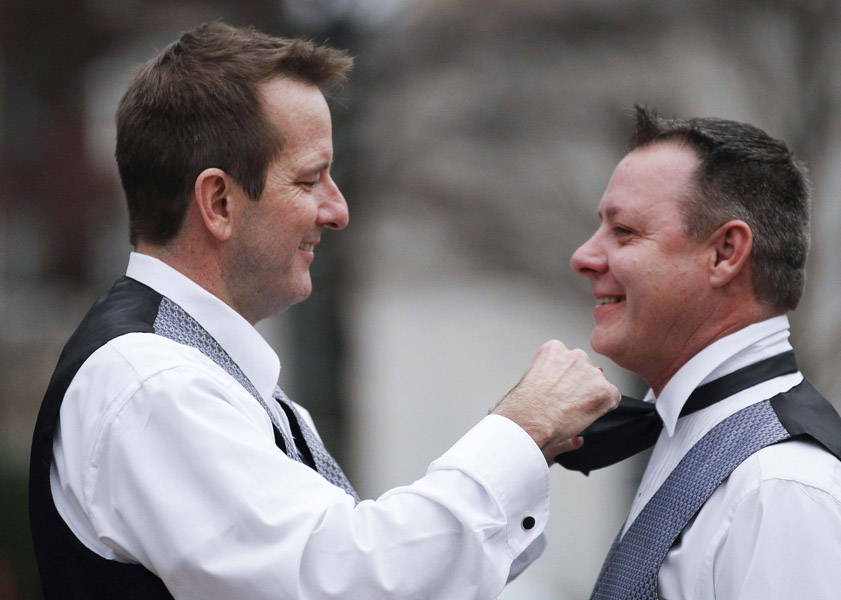
: A couple prepares for their wedding ceremony Feb. 9, 2015, in a park outside Jefferson County Courthouse in Birmingham, Alabama. Same-sex couples began marrying in Alabama after U.S. Supreme Court refused to block ruling overturning state's ban. (CNS/Reuters/Marvin Gentry)
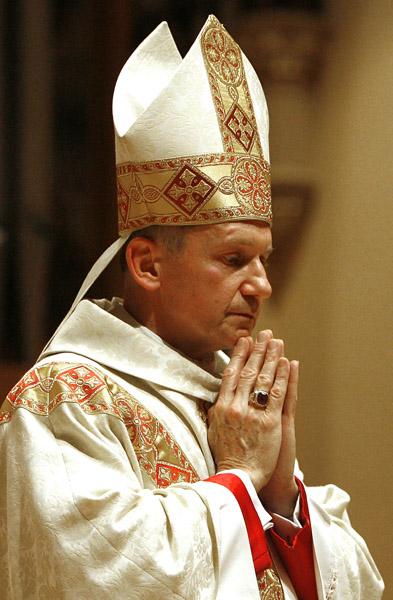
Bishop Thomas Paprocki of Springfield, Illinois, is pictured in a 2010 photo. (CNS/Karen Callaway, Catholic New World)
In June 2017, Bishop Thomas Paprocki of Springfield, Illinois, issued a decree to pastors in his diocese on the treatment of same-sex married couples. It is a long list of "thou shalt nots."
Thou shalt not preside at a gay marriage; thou shalt not give Communion to married gay couples; and, most controversially, thou shalt not allow a church funeral for a deceased same-sex spouse. The reason given for the last prohibition is that "Unless they have given some signs of repentance before their death, deceased persons who had lived openly in a same-sex marriage giving public scandal to the faithful are to be deprived of ecclesiastical funeral rites" [emphasis added].
Bishop Robert Morlino of Madison, Wisconsin, through his vicar general, Fr. James Bartylla, followed by denying a Catholic funeral to a "Person in a Homosexual Civil or Notorious Union," offering the same rationale. "The main issue," Bartylla writes, "centers around scandal and confusion (leading others into the occasion of sin or confusing or weakening people regarding the teachings of the Catholic Church in regards to sacred doctrine and the natural law), and thereby the pastoral task is to minimize the risk of scandal and confusion to others amidst the solicitude for the deceased and family."
Both directives cite as a justification Canon 1184, which states that, unless they show signs of repentance before death, "manifest sinners … cannot be granted ecclesiastical funerals without public scandal of the faithful" [emphasis added].
Avoiding scandal
The moral obligation to avoid scandal is biblically based. Jesus warns the man who would lead the "little ones" into sin that it "would be better for him to have a great millstone fastened round his neck and to be drowned in the depth of the sea" (Matthew 18:6; cf. 1 Corinthians 8:10-13). He asserts that "temptations to sin are sure to come; but woe to him by whom they come!" (Luke 17:1). The Catechism of the Catholic Church defines scandal as "an attitude or behavior which leads another to do evil. The person who gives scandal becomes his neighbor's tempter. … Scandal is a grave offense if by deed or omission another is deliberately led into a grave offense" (2284). It is clear, then, that in both Scripture and tradition, scandal is a serious issue and something to be avoided.
What is not clear, however, and what is not defined, is what constitutes scandal and how are claims of scandal to be justified.
The assertion that an attitude or behavior would cause 'public scandal' is precisely that, an assertion ... it needs to be justified by ethical argument.
While the two bishops assert that permitting a church funeral for a deceased same-sex spouse would give scandal for seeming to condone same-sex relationships, other Catholics assert that denying a church funeral to a deceased same-sex spouse would give scandal for seeming to justify discrimination against homosexuals. Which claim to scandal is justified?
Scandal is a personal moral judgment that the immoral behavior or attitude of one person leads another to do evil, and is therefore, we suggest, in the eye of the beholder. We ask, however, are there any objective criteria for determining whether or not the beholder is making an accurate moral judgment of an attitude or behavior that would cause him scandal and lead him to do evil?
The assertion that an attitude or behavior would cause "public scandal" is precisely that, an assertion, not an ethical argument and, like any assertion of right or wrong, it needs to be justified by ethical argument. In the following we argue, in three points, that there are ethical and canonical guidelines for justifying claims to scandal and, further, that public scandal in the case under consideration is more likely to be caused by the bishops' attitude and behavior than with the permitting of a church funeral to a deceased same-sex spouse.
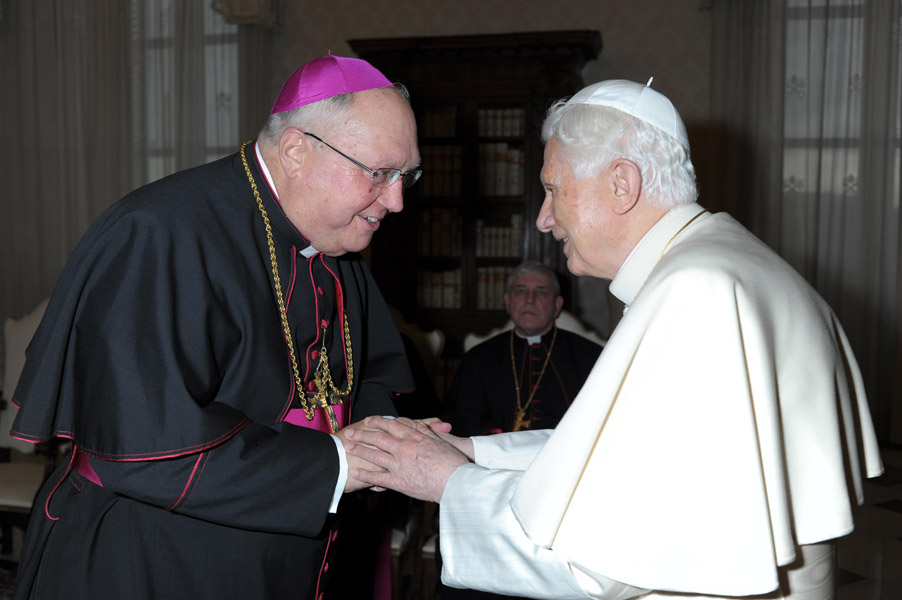
Pope Benedict XVI greets Bishop Robert Morlino of Madison, Wisconsin, during a Feb. 10, 2012, meeting with U.S. bishops from Wisconsin on their "ad limina" visits to the Vatican. (CNS/L'Osservatore Romano)
What is scandal?
Our first point revolves around the definition of scandal and how assertions of scandal are to be justified. Scandal, to repeat, "is an attitude or behavior which leads another to do evil." This definition raises the question, wherein lies the scandal in the case under discussion? Is it in permitting a church funeral to a deceased same-sex partner that would lead others to engage in homosexual behavior, or is it in the behavior of the bishops directing priests to deny a church funeral to a deceased spouse in a same-sex marriage that would lead others to engage in discriminatory attitudes and behaviors towards same-sex couples in specific, or members of the LGBT community in general?
As with most ethical issues, there are often multiple and conflicting norms to guide one's moral judgment of both an attitude and a behavior. Before addressing those norms, we make an important distinction between the morality of an attitude and a behavior.
The catechism's definition of scandal rightly distinguishes between an attitude and a behavior. This is a common distinction made in Catholic theological ethics, between the goodness or badness of a moral agent, her attitude, disposition or character, and the rightness or wrongness of a behavior or act.
Why the distinction? Because an attitude and a behavior do not always coincide morally. The classic example is giving alms (a morally right behavior) for vainglory (a morally bad attitude). We morally evaluate behavior on how it impacts relationships and human dignity. In the case of almsgiving everything else being equal, it improves human dignity. The act, therefore, is right. Vainglory, however, is a morally bad attitude that, according to Thomas Aquinas, makes the act morally bad but does not necessarily make the behavior wrong. A bad attitude, being unmerciful or uncharitable, for instance, always makes a right or wrong behavior morally bad. A wrong behavior, however, engaging in a homosexual act, for instance, is not always morally bad if it is done with a good attitude.
Describing homosexuality as an 'objective disorder' and the specious language … about 'not unjust discrimination' of homosexuals … have caused infinitely more scandal than any church funeral for a deceased same-sex spouse.
There is, in other words, an important moral distinction and hierarchy in the moral norms guiding attitudes and behavior. Attitude or virtue norms are absolute. A person must always be just, loving and merciful; to be unjust, unloving or unmerciful is always morally bad by definition, can never be justified, and would make even a right behavior morally bad. Behavior norms, however, though they may be absolute like the norm prohibiting homosexual behavior, do not necessarily make a behavior morally bad. Depending on the attitude, as well as a well-informed conscience, a wrong behavior may not be morally bad and may even be morally good. If the behavior is not morally bad, it follows that there is no grave sin and, therefore, no legitimate public scandal.
Based on the distinction between attitude and behavior, there are different and often competing norms that must be considered to justify claims of scandal. The competing norms in the case under consideration are numerous: church proscription of homosexual behavior; Pope Francis' teaching on the attitudes/virtues of mercy, compassion and love for all God's people, including all homosexual people; the Gospel commandment to love God and to love our neighbor as ourselves; and the golden rule to do unto others as you would have them do unto you. Claims of public scandal depend not only on the acknowledgment of the norms a person believes are being violated and causing scandal, but also on the belief that any seeming disregard of those norms will lead others to do evil.
It is hard to imagine, and no argument is provided to fuel the imagination, that a church funeral for a deceased same-sex spouse would lead Catholics to believe either that the church no longer teaches that homosexual behavior is wrong or that homosexual behavior is now moral. A 2017 Pew Research Survey shows that the majority of U.S. Catholics (67 percent) support same-sex marriage. It would be a stretch of the moral imagination to claim that the moral stance of this majority is a result of public scandal caused by permitting the church funeral of a deceased same-sex spouse. It is much more readily imaginable that the bishops' denial of a church funeral causes scandal to this majority by seeming to legitimize further the type of church discrimination they have experienced so often in the church against homosexual persons.

Couples take part in a same-sex wedding ceremony Feb. 5, 2015, in Fort Lauderdale, Florida. (CNS/Reuters/Javier Galeano)
The language of the church describing homosexuality as an "objective disorder" and the specious language from the U.S. Conference of Catholic Bishops about "not unjust discrimination" of homosexuals in opposition to the Employment Non-Discrimination Act have caused infinitely more scandal than any church funeral for a deceased same-sex spouse has done or is likely to do.
In the light of the distinction between attitudes and behaviors and the norms governing them, it is clear that the scandal at issue here can be evaluated from different perspectives.
From the bishops' perspective, claims of public scandal can be justified by the homosexual behavior of same-sex couples and by the fear that permitting a church funeral for a deceased same-sex spouse might lead others to believe that the church condones such behavior, leading others to engage in this condemned behavior.
From the perspective of the Catholic faithful, the public scandal occasioned by the bishops' decrees might lead them to believe that unjust discrimination against same-sex couples and the violation of the virtues of love, mercy, and compassion, so much at the heart of both the Gospel and Pope Francis' papacy, are legitimate, leading them to engage in this same discrimination and violation.
The teaching of the church against homosexual behavior is clear, all Catholics know it, and it is highly unlikely that a simple, and probably anonymous, church funeral would lead anyone to believe that the church's teaching is no longer in effect and to engage in homosexual behavior. The church teaches that "not unjust discrimination" against homosexual persons is legitimate and ethical and it is much more likely that some people would believe that the bishops are justifying discrimination against homosexuals in the church that goes way beyond the norm for such "not unjust discrimination" in the secular professions.
We argue, in short, that the decrees of the two bishops' are more likely to cause public scandal among Catholic Americans by appearing to legitimize discrimination against homosexual persons. We support that argument by a consideration of the church's canon law and its teaching on the freedom and inviolability of conscience.
Understanding doctrine
Our second point, then, is canonical and invites a hard critique of the bishops' understanding of Catholic doctrine. The catechism teaches that "mortal [or grave] sin is sin whose object [behavior/act] is grave matter and which is also committed with full knowledge [of the wrongness of the behavior] and deliberate consent" (1857). The bishops' rationale at the root of their decrees too easily elides the grave matter of homosexual behavior into grave sin to justify their assertion of scandal. There is no doubt that, in the eyes of the church, the sexual behavior of same-sex married couples constitutes grave matter; nor is there any doubt that it constitutes grave sin only when the participants have the required full knowledge and deliberate consent. It is beyond all reasonable doubt that the behavioral criterion of "full-knowledge" is fulfilled in the case of all same-sex Catholic couples, for the Catholic Church teaching that condemns all homosexual behavior as wrong is well-known.
What is not beyond doubt is whether the attitudinal criterion of "deliberate consent" is achieved, for deliberate consent can be interfered with in multiple ways. The catechism clearly teaches that Catholic position: "Imputability and responsibility for an action [behavior] can be diminished and even nullified by ignorance, inadvertence, duress, fear, habit, inordinate attachments, and other psychological or social factors" (1735).
It adds, when speaking of masturbation, that "to form an equitable judgment about the subject's moral responsibility and to guide pastoral action, one must take into account the affective immaturity, force of acquired habit, conditions of anxiety, or other psychological or social factors that lessen or even extenuate moral culpability" (2352). That instruction applies to every behavior that involves grave matter.
In the established Catholic moral tradition, any behavioral decision must discern not only the objective moral truth proposed to it but also any and every relevant subjective circumstance in which moral action takes place.
It is no surprise, therefore, to see Francis clearly teach this doctrine in Amoris Laetitia, his 2016 apostolic exhortation on family life known in English as "The Joy of the Gospel," in several different ways, without in any way abandoning or diminishing Catholic moral doctrine or behavioral norms.
The church, he argues, "possesses a solid body of reflection concerning mitigating factors and situations. Hence it can no longer simply be said that all those in any 'irregular' situation are living in a state of mortal sin and are deprived of sanctifying grace."
Even though the behavior is wrong in the church's eyes, "deliberate consent" may be mitigated on the part of the agent and, if deliberate consent is lacking, there cannot be grave sin.
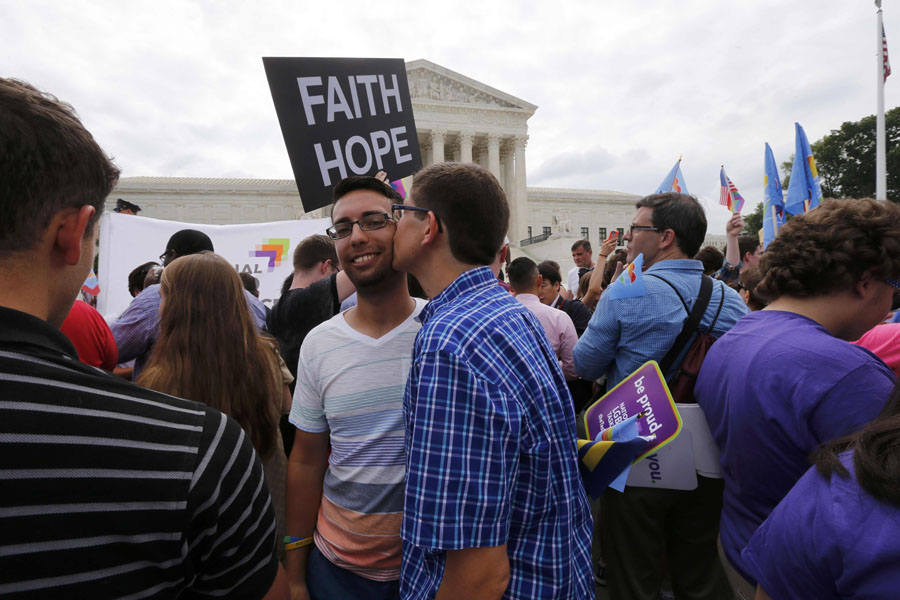
Gay rights supporters celebrate outside the U.S. Supreme Court building in Washington June 26, 2015, after the justices ruled in a 5-4 decision that the U.S. Constitution gives same-sex couples the right to marry. (CNS/Jim Bourg, Reuters)
Francis limits his consideration of irregular situations to couples who are divorced and remarried without an annulment and couples who are cohabiting, but his analysis applies also to other situations considered gravely sinful, such as a same-sex union. Factors may exist in all irregular situations which limit "deliberate consent" and the ability to make a fully informed moral decision (Amoris Laetitia, 301).
If deliberate consent is lacking or somehow diminished, there can be no grave sin and, therefore, no scandal in permitting a church funeral to a deceased same-sex partner. One way to avoid unnecessary scandal is to effectively disseminate authentic Catholic teaching to those who may be too ready to be scandalized.
If there is any doubt whatever about the absence of deliberate consent to their grave behavior, neither same-sex married couples, nor couples divorced and remarried without an annulment, nor cohabiting couples can be accused of grave sin and, therefore, be denied a church funeral or Communion. Grave sin cannot be presumed simply because there is grave matter. Whether or not the conditions for grave sin have all been fulfilled can be decided only by a process of discernment guided by a counselor inside or outside the sacrament of reconciliation (Amoris Laetitia, 291-312) and culminating in an internal forum judgment of personal conscience.
Those who are not guilty of grave sin because the conditions for grave sin have not all been met must be admitted to Communion as prescribed by Canon 912 of the law of the Catholic Church: "Any baptized person who is not prohibited by law can and must be admitted to Holy Communion." If this law applies to Holy Communion, it most certainly applies also, mutatis mutandis, to church funerals for a deceased same-sex married partner.
It is uncharitable, unjust and discriminatory for a bishop to issue a decree denying a church funeral to a deceased same-sex partner on the presumption that the deceased died in grave sin. It is also against the law of the Catholic Church which prescribes that the deceased who are not guilty of grave sin because the conditions for grave sin are not known to have all been met "must be given ecclesiastical funerals according to the norm of law" (Canon 1176).
The well-formed conscience
Third, and finally, in addition to conflating erroneously grave matter and grave sin to justify their assertion of possible public scandal, the two bishops also ignore the consistent Catholic doctrine on the authority and inviolability of a well-formed conscience. Already in the 13th century Thomas Aquinas established this authority. "Anyone upon whom the ecclesiastical authorities, in ignorance of the true facts, impose a demand that offends against his clear conscience, should perish in excommunication rather than violate his conscience" (Aquinas, Commentary on the Sentences, Book IV).
Pope Francis' view of conscience reflects the role, function, and authority of conscience as set forth by Thomas Aquinas and the Second Vatican Council.
After the First Vatican Council's declaration of papal infallibility in 1870, this teaching on conscience became submerged in exaggerated claims for the doctrinal authority of pope and bishops. The way that Catholics were to make a moral decision was then set forth by Pope Pius X: "The church is essentially an unequal society, that is, a society comprising two categories of persons, the Pastors and the flock." The latter have "one duty ... to allow themselves to be led, and, like a docile flock, to follow the Pastors" (Vehementer Nos, 8).
It could not be clearer: to make a moral judgment, according to Pius X, all a faithful Catholic need do is to follow the instructions of his/her pastors in hierarchical power. This was the view also of Pope John Paul II and apparently also of Bishops Paprocki and Morlino.
Pope Francis' view of conscience is different and reflects the role, function, and authority of conscience as set forth by Thomas Aquinas and the Second Vatican Council: "In all his activity," the council teaches:
"A man [and also a woman] is bound to follow his conscience faithfully, in order that he may come to God. … It follows that he is not to be forced to act contrary to his conscience. Nor, on the other hand, is he to be restrained from acting in accordance with his conscience, especially in matters religious" (Dignitatis Humanae, 3).
In this authentic Catholic perspective, a Catholic makes concrete moral judgments by following his or her personal conscience, a practical judgment that he or she should or should not engage in this particular behavior or should or should not have this particular attitude.
Given universal human weakness, of course, any such practical judgment of conscience can be in error. If the error cannot be ascribed to moral fault, failure to gather the necessary evidence, to engage in the necessary deliberation, to take the necessary counsel, for example, the practical judgment of conscience not only can but also must be followed.
When a faithful Catholic has done all he or she can do in the circumstances and within his or her limitations to gather information, to take appropriate counsel, to deliberate, to discern, he or she can fall back on the practical judgment of conscience, even if, as Aquinas argued, the judgment is contrary to church authority.
In the case in which a same-sex couple judges, according to a well-formed conscience, that intimate sexual behavior within their relationship is not wrong but right, they are morally justified in following that judgment. Their homosexual behavior would certainly violate the Catholic norm condemning homosexual behavior, but it would not be a bad attitude and gravely sinful. It ought not, then, to be used without evidence to justify claims of public scandal.
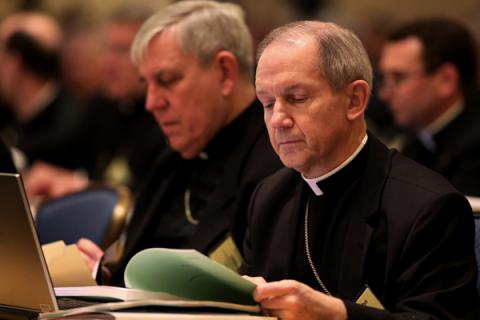
Bishop Thomas Paprocki of Springfield, Illinois, looks over papers Nov. 10, 2014, during the annual fall general assembly of the U.S. Conference of Catholic Bishops in Baltimore. (CNS/Bob Roller)
True scandal
We end this analysis by concluding that, since grave matter cannot be presumed without evidence to be also grave sin, Paprocki and Morlino run a greater risk of public scandal by denying a church funeral to a deceased same-sex partner, thereby seeming to condone and promote unjust discrimination against homosexual couples, than by allowing a church funeral, thereby seeming to condone and promote homosexual behavior.
Their decrees so lack any ethical, canonical or pastoral justification that they can cause public scandal, not the scandal of promoting homosexual behavior by permitting the church funeral of a deceased same-sex partner, but the scandal of promoting discriminatory attitudes of unjust judgment and condemnation of homosexual partners. The lack of the Gospel virtues of love, mercy and compassion in their decrees, their implied and unsupported presumption of the condition of a dead person's spiritual life, and their outmoded Pius X approach to the authority and inviolability of personal conscience can all cause the public scandal of promoting discrimination against gay and lesbian couples.
Advertisement
Understanding Catholic teaching on the authority of conscience, Pope Francis has correctly stated that we, that is, Catholic pastors and faithful alike, "find it hard to make room for the consciences of the faithful, who very often respond as best they can to the Gospel amid their limitations."
We have been called, he adds, "to form consciences, not to replace them" (Amoris Laetitia, 37).
He has also several times invited the church to apologize for the hurt it has caused homosexuals.
The decrees denying a church funeral to a deceased same-sex partner, with the presumption to know the condition of his or her soul, can only give public scandal to the majority of Catholics who support gays and lesbians with natural homosexual orientation, and who look to their leaders to also acknowledge, understand and support them.
The church has caused enough hurt to homosexuals in her history. It is time for the hurt to end and to be replaced with understanding, compassion and acknowledgment of the dignity of every human being, including every homosexual human being.
[Todd A. Salzman is the Amelia and Emil Graff Professor of Catholic Theology at Creighton University. Michael G. Lawler is the emeritus Amelia and Emil Graff Professor of Catholic Theology at Creighton. They are the co-authors of The Sexual Person (Georgetown University Press).]




